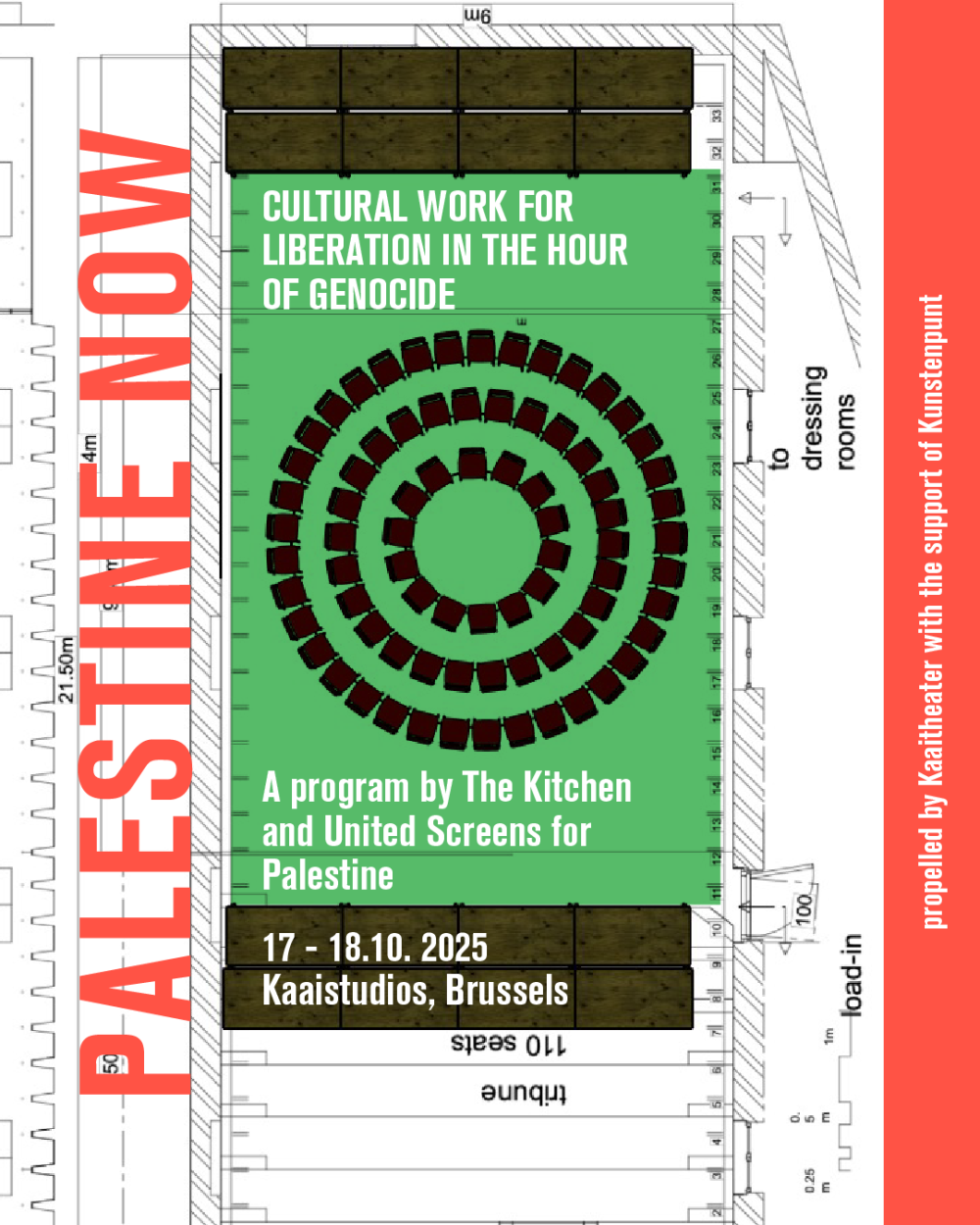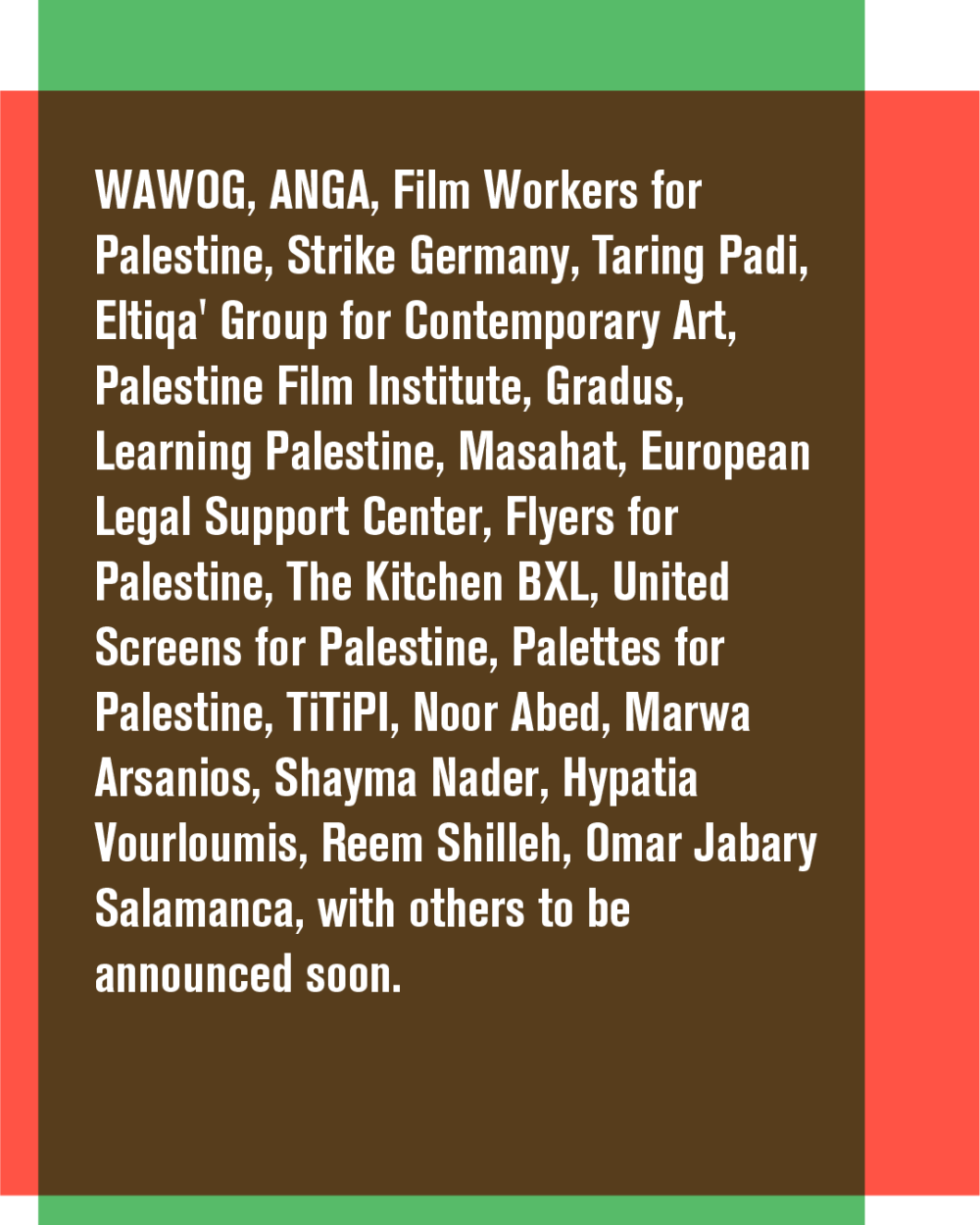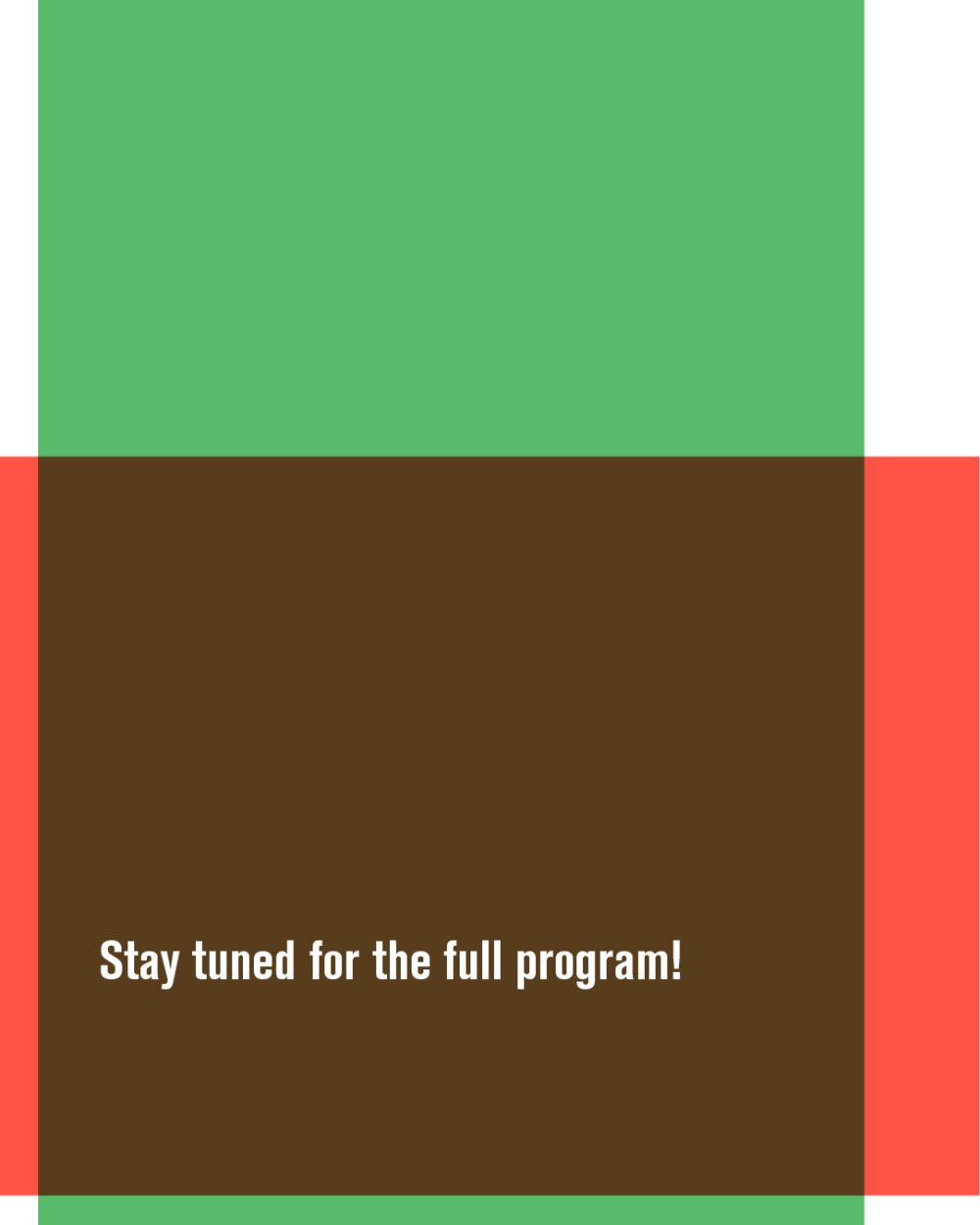PALESTINE NOW
CULTURAL WORK FOR LIBERATION IN THE HOUR OF GENOCIDE
PALESTINE NOW is a two-day gathering that brings together cultural workers committed to the liberation of Palestine to think collectively about the current political juncture. We come together not only to share experiences, but to look each other in the eye, and to create a space for reflection. We ask what have we learned from doing cultural work in the hour of genocide? How have our practices and organising shifted and adapted in the face of authoritarianism and repression? What histories and forms of cultural work for Palestinian liberation can inform our work as we move forward? This is not just a conversation, but an intentional effort to learn from one another, to build bridges across geographies, and to imagine how cultural work can continue towards liberation.
Participants and facilitators: WAWOG, ANGA, Film Workers for Palestine, Strike Germany, Taring Padi, Eltiqa' Group for Contemporary Art, Palestine Film Institute, Gradus, Learning Palestine, Masahat, Palestine Music Expo [PMX], European Legal Support Center, Flyers for Palestine, The Kitchen BXL, United Screens for Palestine, Palettes for Palestine, TiTiPI, Noor Abed, Marwa Arsanios, Shayma Nader, Hypatia Vourloumis, Reem Shilleh, Omar Jabary Salamanca, with others to be announced soon.
PROGRAMME
DAY I · FRIDAY 17.10: PAST PRESENT
10:00-10:30 Welcome at Kaaistudios
10:30-12:30 CONVERSATION I · CULTURAL WORK FOR WHAT?
Facilitators: Reem Shilleh and Omar Jabary Salamanca
Why are we gathering in Brussels? Why now? What is expected from this convergence of collectives?
This opening session introduces the program and situates the gathering within the current political moment — a time when cultural workers have played a decisive role in denouncing genocide, mobilizing international solidarity, and redefining the terms of cultural organizing.
We will begin by introducing ourselves and our collectives, sharing how each of us has mobilized within our respective contexts. This session establishes the purpose of our coming together: to ask what cultural work is for when the stakes are survival, liberation, and historical accountability.
12:30-14:30 Free Time
14:30-16:30 CONVERSATION II · CULTURAL WORK UNDER WHAT CONDITIONS?
Facilitators: Shayma Nader and Casey Asprooth-Jackson
Prompts by: Palestine Film Institute, Eltiqa' Group for Contemporary Art, Palettes of Palestine and Strike Germany
What has changed for cultural workers before and after the Al-Aqsa Flood? What new urgencies and constraints define our labor today?
This conversation examines the political and economic conditions shaping cultural work in Palestine and across global contexts. We will reflect on how settler-colonial expansion, alongside authoritarianism, neoliberal retrenchment, and the precaritization of labor, intersects with censorship, repression, and criminalization.
If the tide has shifted and Palestine is everywhere, how does this renewed visibility transform our practice? What new risks, opportunities, and contradictions emerge? How has collective organizing adapted to sustain resistance in increasingly hostile environments?
16:30-17:00 Break
17:00-17:30 Banner Unrolling: “People’s Justice #7” with Taring Padi
Entitled عدالة الشعوب (Adalet El Sho’ob/People’s Justice) in Arabic, this on-going banner embodies the culmination of a profound journey of learning and working together between Taring Padi collective and the collectives of The Kitchen, Global Aroma, Learning Palestine, Subversive Film and The Question of Funding.
At its core, the hundred years old olive tree symbolises the resilience, conviction and, and hope inherent in the struggle of Palestinian people. Encircled by a human chain, the tree stands tall and raises a clenched fist that strikes the dark oppressive force of Western power – personified by a male head wearing crown of Eifel tower, White House, and Big Ben -- that perpetuate the occupation and colonialism of Palestinian land. Wrapped around the wrist of this defiant fist is a strand of prayer beads, leading to a house key. This key represents the collective memory of every Palestinian family forced from their homes, carrying with them the enduring hope of eventual return. Though this return may not occur within their lifetimes, it is envisioned for future generations, symbolized by the fetus nestled within the womb of the olive tree. This is the generation who will continue the struggle for the Palestinian freedom, from the river to the sea. The roots of the olive tree intertwine with the broader tapestry of resistance in the Global South, uniting Palestinian struggles with those of the first nation peoples, black panther, Vietnam's triumph over American imperialism, South Africa's dismantling of apartheid, the Zapatistas in Mexico, and Aboriginal struggles in Australia. The Palestinian struggle is our struggle of the larger battle against modern imperialism.
17:30-19:30 CONVERSATION III · CULTURAL WORK FROM WHERE AND WITH WHOM?
Facilitators: Rana Issa and Christopher Daley
Prompts by: Learning Palestine, PMX, Film Workers for Palestine and Gradus
How do the places where we live, organize, and work shape what we do — and with whom? How do we build alliances and solidarities within and across borders, collectives, organizations, and institutions?
This session explores how the spaces we inhabit and the contexts in which we operate define our cultural and political possibilities. We will reflect on collaborations rendered possible or impossible by shifting political conditions, and on the practical challenges of building coalitions for liberation.
We will also interrogate our relationships to cultural institutions: what does it mean to work within, with, or against them? How do we imagine and build alternative infrastructures that sustain our practices outside the logics of extraction and complicity? This is an invitation to rethink where and with whom cultural work happens, and how we locate ourselves within the global movement to support Palestinian liberation and return.
19:30-20:30 Dinner provided by Olive Restaurant
20:30-21:30 Collective reading of Noor Abed's book Stars at Midday
A session of collective reading and listening of the book Stars at Midday.
Stars At Midday, first published in October 2024 by Occasional Papers, is Noor Abed’s personal diary from the production phase of 'A Night We Held Between’, the film she made in Palestine in 2023. The book compiles notes and observations she collected during phases of research, location scouting, and filming with family and friends.
The book interweaves narrative fragments, song and diaristic observations, creating a fusion of spontaneous and choreographed sequences of movement, with documentary elements.
DAY II · SATURDAY 18.10: PRESENT, FUTURE
15:00-17:00 CONVERSATION IV · CULTURAL WORK HOW? I · REPERTOIRES AND TACTICS
Facilitators: Noor Abed and Hypatia Vourloumis
Prompts by: United Screens for Palestine, ANGA, Masahat and Taring Padi
How have our collectives organized cultural work into concrete strategies? What tactics and infrastructures have proven most effective?
In this session, we will reflect on the repertoires cultural workers have developed in recent years — from protocols and solidarity funds to digital mobilizations, collective publishing, and direct actions. We will trace how these practices have redefined cultural work as a form of political organizing, transforming the means of artistic and intellectual production into instruments of struggle.
This and the next session are envisioned as moments to learn from one another’s methods — to share what has worked, what has faltered, and what remains to be invented.
17:00-17:30 Break
17:30-19:30 CONVERSATION V · CULTURAL WORK HOW? II · CONTINUITY AND WORK AHEAD
Facilitators: Sara Abu Ghazal and Crystal Bennes
Prompts: WAWOG, TiTiPI, European Legal Support Center and The Kitchen
How do we move forward from here? What does it mean to sustain a movement of cultural resistance beyond urgency and into continuity?
This concluding session projects our collective work into the near and distant future. We will discuss how to consolidate the momentum of the past two years while preparing for the protracted struggle ahead.
What infrastructures must we build to ensure that cultural workers continue to play a critical role in the liberation of Palestine — as organizers, educators, and builders of collective futures? Our aim is to identify concrete pathways for collaboration, communication, and continuation — ensuring that this gathering serves not as an endpoint, but as the beginning of a shared infrastructure for liberation.
19:30-20:30 Dinner provided by Olive Restaurant
20:30-21:30 Gradus -العتبة: In Search of Continuity, a performance by Dina Shilleh
“In Search of Continuity” is a performance by Dina Shilleh, founder of the Gradus-العتبة initiative based in Ramallah, Palestine. The performance is a sonic experience of the “Expressions in Cultural Resistance”concert series organized between October 2024 to June 2025, which invited musical creatives to express their personal and collective experiences in the face of the genocide taking place a few kilometers away, exploring a vast array of topics such as imprisonment, fear, trauma, mourning, resistance, resilience, freedom and the meaning of solidarity.
Gradus-العتبة focuses on new music created by professional local practitioners in Palestine today, providing opportunities for them to perform and share their original works within the country. Gradus-العتبة supports the gradual development of the Palestinian contemporary music scene by fostering a continuous flow of musical creation and performance. The initiative also emphasizes documentation, collaboration, and knowledge sharing, addressing both the immediate needs of creators and the long-term preservation of Palestine’s music.
a programme propelled by Kaaitheater | with the support of Kunstenpunt


